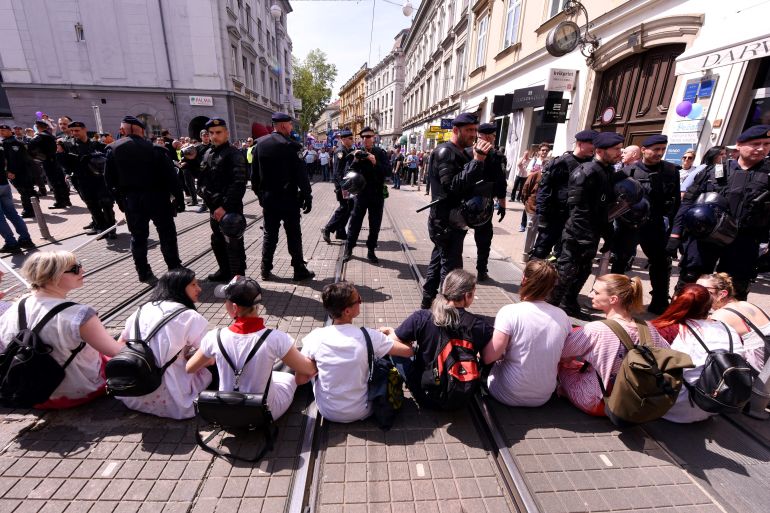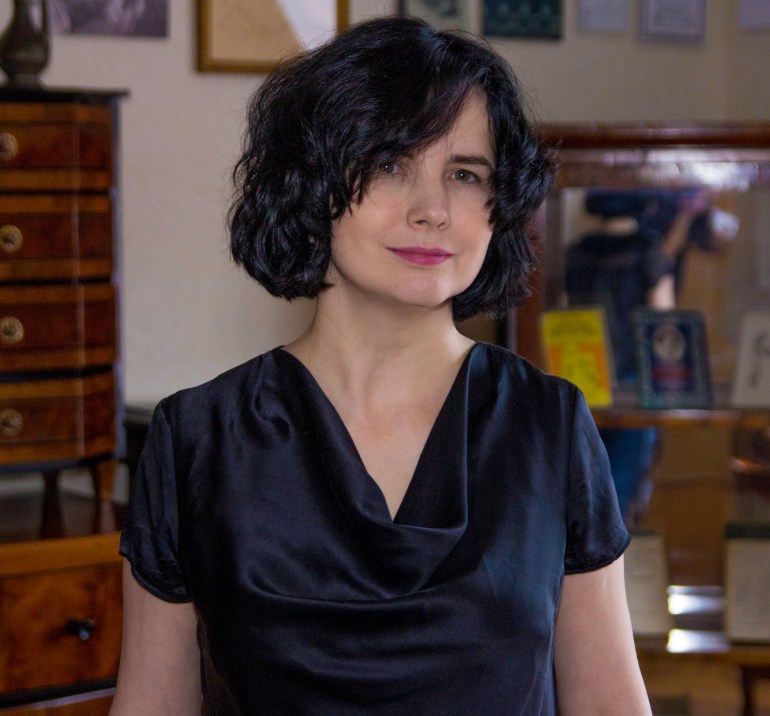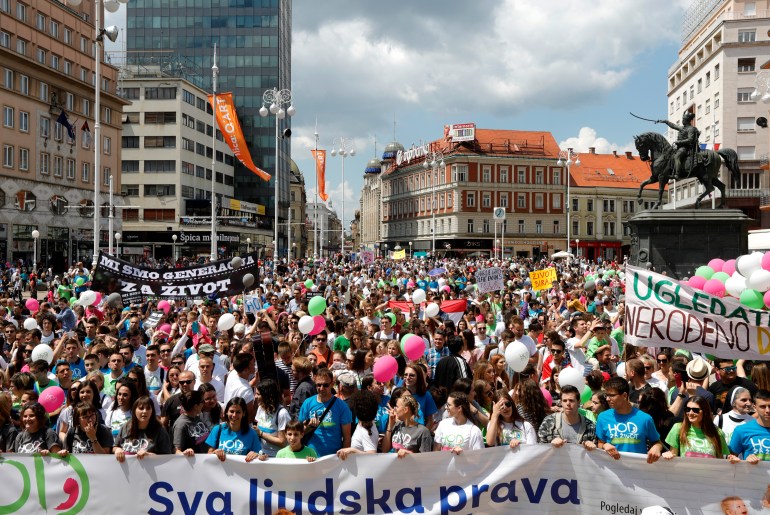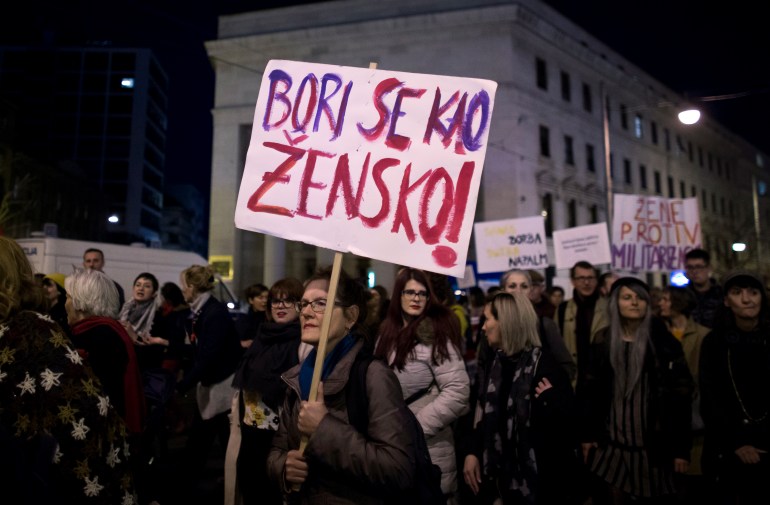Amid stigma in Croatia, volunteers support women having abortions
While terminating a pregnancy is legal in Croatia, access to abortion is becoming increasingly challenging.

Zagreb, Croatia – Zorana did not expect the call to come so soon.
Two weeks earlier, she had signed up online to be a Brave Sister and was still considering the level of involvement she wanted with the new initiative.
Keep reading
list of 4 itemsTen years after Chibok girls kidnapping: One woman’s struggle to move on
Poland lawmakers take steps towards liberalising abortion laws
Polish lawmakers debate reforming strict abortion laws
The mother-of-two was keen to help, but was nervous about the social implications of being associated with such a group.
The Brave Sisters, founded in September last year, sets out to support Croatian women who were having an abortion.
Nada Peratović, a lawyer and the group’s founder, was on the other end of Zorana’s call.
A young woman arranged to have an abortion in neighbouring Slovenia, but did not want to go alone.
Peratović asked Zorana to take her.
“I told Nada I needed five minutes then I hung up the phone” she told Al Jazeera recently, in a quiet café in Zagreb’s old town.
“I questioned myself thinking, ‘Is this something I want to do, can I handle it, am I doing something wrong?’ Then it hit me, there was this woman, who needed help from another woman, and that was all I needed to know.”

Zorana was in.
Peratović says she is determined to reduce the growing stigma around abortion in Croatia but understands Brave Sisters cannot be involved in booking appointments or decision making.
They offer support and nothing more.
Abortion remains a divisive issue in the country.
On Saturday, an annual Walk for Life march will take place in Zagreb.
After a year of lockdowns, pro-choice activists believe ultra-conservatives will use the moment to kickstart their anti-abortion campaign.
Conscientious objection
Abortion is legal in Croatia, yet it is becoming increasingly difficult to access for most women.
Since the country’s independence from the former Yugoslavia in 1991, there have been continual objections to the 1978 law which allows the procedure to be carried out until the 10th week of pregnancy.
According to the World Health Organization, there were 823 procedures per 1,000 live births in 1985.
By 2016 this figure had fallen to 67 procedures per 1,000 live births.

Ultra-conservatives and the majority Catholic Church argue this trend is reflective of Croatia’s attitude towards abortion.
But pro-choice activists say the numbers are the consequence of increased access to contraception, sex education, family planning and fallout from the 2003 amendment which gave doctors the right to conscientious objection.
They also highlight the figures do not reference the unknown number of illegal abortions taking place throughout the country.
“Nearly 60 percent of doctors are now considered conscientious objectors,” Peratović claimed. “As a result, many women are forced to have terminations in private clinics or travel abroad at extraordinary cost and danger to themselves.”
Zorana picked up the young woman on a cold day in December.
COVID tests in hand, it was an awkward drive to the Slovenian border an hour away.
The 45-year-old rambled about the pandemic and started complaining about her kids – something she later berated herself for.
“We were both so insecure” she said.
They told the border guards they were going to visit a friend in hospital and were let through.
At the clinic, they were separated and could only communicate by WhatsApp.
“She was so frightened,” Zorana said. “She gave me second-by-second updates all the way through.”
While she waited, Zorana bought some juices and sandwiches at a nearby SPAR and a few hours later, when the young woman returned to the car, she burst into tears when she saw the makeshift banquet.
“I don’t think she was crying about the abortion. She kept saying, ‘This is so beautiful’. I think it was because someone did something nice for her and that was a breaking point.”
Of the 130 women who have applied to be a Brave Sister, 40 are now trained after attending a series of lectures.
Among the teachers was veteran gynaecologist Dr Jasenka Grujić, who has witnessed dramatic shifts in access to abortion during her 46-year career.
“You can believe the Virgin Mary was a virgin,” she said, “but if you’re a gynaecologist, you’re the only person who can help a woman if she wants an abortion. If you refuse, you’re going against the values of our profession.”
But Dr Boris Ujević, a gynaecologist at the Holy Spirit Hospital in Zagreb, wants more restrictive abortion laws and believes conscientious objection is an “essential human right”.
He rejects Grujić’s argument, saying: “Medicine is about healing and abortion doesn’t do that.
“I’d like to see abortion on demand outlawed but that can’t happen after a 2017 ruling from the constitutional court, which said the 1978 law doesn’t violate the constitution. So I think obligatory counselling should be introduced to help women.”
There is growing concern among the Brave Sisters that such a move would make life harder for women.
Nonetheless, ultra-conservative groups and the Catholic Church are continually lobbying the conservative Croatian Democratic Union (HDZ) government to add such requirement.
Many of the lobbyists are often young people who believe their elders are too liberal on the issue.
Ivancica Djukec, another Brave Sister, is ready to face any obstacles.
The 43-year-old was determined to sign up after struggling to find unbiased information on abortion when she learned of a fatal foetal anomaly in the 17th week of her second pregnancy.
“I endured 18 hours of torment and pain, everything real childbirth brings but there was no happy ending. Friends and family looked at me in amazement after that and asked if there wasn’t a more ‘human approach’ to the solution. That made me so lonely. Brave Sisters is working to ensure others don’t experience that.”
